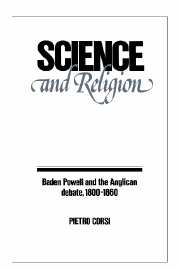Book contents
- Frontmatter
- Contents
- Preface
- List of abbreviations
- PART I
- PART II
- PART III
- The new synthesis and its developments
- 11 The methodology of science
- 12 The Christian apologetic and the fallacies of natural theology
- 13 Christian tolerance
- 14 The parting of the ways: Baden Powell versus Richard Whately
- PART IV
- Bibliography
- Index
The new synthesis and its developments
Published online by Cambridge University Press: 15 December 2009
- Frontmatter
- Contents
- Preface
- List of abbreviations
- PART I
- PART II
- PART III
- The new synthesis and its developments
- 11 The methodology of science
- 12 The Christian apologetic and the fallacies of natural theology
- 13 Christian tolerance
- 14 The parting of the ways: Baden Powell versus Richard Whately
- PART IV
- Bibliography
- Index
Summary
In the opening paragraphs of his essay on Rational Religion published in 1826, Baden Powell assumed that revelation was accepted by the British population at large. The controversial question was then how to interpret the scriptures. Baden Powell concluded that the theory of the reasonableness of Christianity endorsed by the Anglican Church provided the only approach capable of reconciling the advance of knowledge with a sound adherence to the Christian religion. During the following decade he became aware that the Christian religion failed to appeal to extensive sectors of the British population. He also came to appreciate that his 1826 synthesis of philosophy and Anglican apologetics was regarded as defective by growing numbers of his Oxford and Anglican colleagues.
Furthermore, in the context of the political, institutional and intellectual developments of the 1830s, his Noetic friends became increasingly hesitant to apply their coherent strategy of timely concession and cautious receptiveness to new intellectual trends. Baden Powell's appraisal of the contemporary social and political situation, the solution he proposed for the admission of Dissenters to the English universities, and his interpretation of the relationship between science and religion met with open hostility at Oxford, and failed to convince his Noetic allies.
- Type
- Chapter
- Information
- Science and ReligionBaden Powell and the Anglican Debate, 1800–1860, pp. 143 - 149Publisher: Cambridge University PressPrint publication year: 1988



